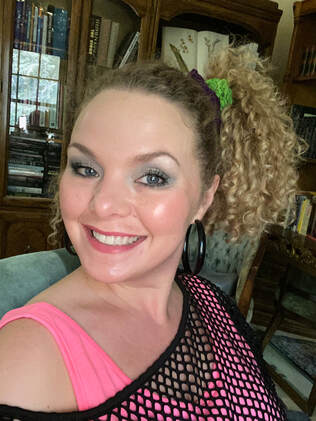 I’m staring 40 in the face. It’s only two days away, and it feels huge. I don’t feel that old. In so many ways, I feel like I’m still waiting for my life to begin. My 20’s were full of naïveté and ease. I thought was strong and competent, and I think I made a pretty good show of it. I spent a lot of my 20’s pretending. I longed to be somehow more and less than I was. I wanted to be both physically smaller and eminently bigger (read: attractive and important) because I bought into the lie that those were the most important determining factors of self-worth. I spent my 20’s creating a version of myself that I thought was strong and competent. I took a teaching job at a school so small that I was a department unto myself, so I was in charge of a lot of people. Granted, they were all between the ages of 14-18, but I was still bossing people around for a living, and I was good at it. It wasn’t hard to feel important—big fish in a small pond and all. I had my sights set on family, on 2.5 (well, I wanted 5) kids and a white picket fence. I had the husband, the job, the house. It felt like a video game level I had to complete. But then I turned 30, and that mask of competence and badassery was ripped away in a hurricane of infertility and epilepsy. It felt like someone pulled the plug on the Nintendo when I was just about to rescue the princess. My 30’s have been pockmarked by loss and disappointment. The doctors told us a biological family was not only unlikely, but physically impossible. They told me I had epilepsy, chronic migraine, and fibromyalgia, and they tried a zillion medications to quiet my overactive nerves and get the seizures and headaches under control. I surrendered my job, my consciousness, my driver’s license, and my dignity. So much for feeling strong and competent. My 20’s were about striving for an ideal, about striving for the “American dream.” It was a time ripe with possibility and confidence, and the self I’d crafted reflected both. But my 30’s have been about learning to live without that mask I’d made in my 20’s. Actually, they’ve been about exactly that—learning to be without—without a driver’s license, without a job, without biological children, even without makeup. I’ve even embraced my natural hair color—figured I should enjoy it before it turns gray. My 30’s have been about radical acceptance of what is, about collecting the shattered pieces of my reality and trying to fashion them into something new and beautiful. But my 30’s have also been about grief, about the death of so many dreams. I never did rescue that princess. When the Nintendo rebooted, that game no longer worked. I found myself playing a different game entirely. So as I embark on my 40’s, I am facing a fresh start. A second (third? fourth?) chance. A new game. Every decade of my life has been an act of creation. I want my 40’s to be marked by the daring humility of new beginnings. I just earned my yellow belt in taekwondo. I realize this may not be much of an accomplishment—it’s one level up from white, which is the color all beginners wear. But that wasn’t the true accomplishment. The true accomplishment was setting down my own stubborn pride and allowing myself to be a beginner. It was opening myself to the possibility of failure. It was embracing the discomfort of inexperience and recognizing that failure is simply a risk one must take to truly live. I spent my 20’s avoiding failure. I spent my 30’s mired in failure. I want to spend my 40’s boldly risking failure. So, in that spirit, I’m going roller skating tonight, something I haven’t done in more than 25 years. I might fall. (I realize that I probably will—I scheduled a preemptive chiropractor appointment for Monday morning.) But I bought a hot pink romper, put my hair into a wild side ponytail, and slathered on the blue eyeshadow to commemorate the occasion. My roller skates even have pink light-up wheels. I have decided to spend this next decade doing some of the things I’ve never dared to do before:
Cheers to new beginnings and bold failures. Here’s to a fresh start, a reboot, a bonus life, and a new princess to rescue, even if it takes a few tries. It’s time to be 40. Might as well make the most of it!
1 Comment
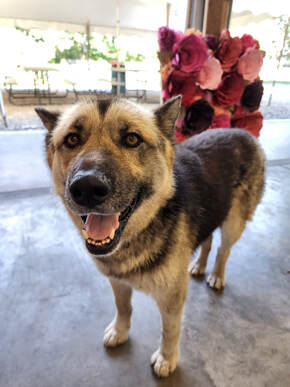 We threw a Quinceañera last night for our Mexican foster daughter, despite never having been to one ourselves. We were out of our element, but in an incredible way, and the party was fantastic—so fantastic, in fact, that one guest refused to leave. Maybe “guest” is the wrong word. She wasn’t invited, and her presence was a bit shocking. I’m talking about a dog. She just wandered into our yard, looking scruffy and unkempt. Maybe she followed the taco truck, hoping for a free meal. Maybe she followed the crowd; I don’t know. Whatever the reason, she came for the party, and when I woke up this morning, she was asleep on the front steps of our house. Like she belonged there. I honestly wouldn’t mind if she stayed. She has a wonderful presence, at once sweet and serene. Her ears are scabby and she needs a good grooming, but she’s gentle and well-mannered. Guests at the party spent time pulling clumps of shedding fur from her coat and cockleburs from her tail. She has a beautiful, friendly face and those melt-your-heart eyes. But she has a collar, even though there are no tags on it. Someone owns this sweet creature. (If she were my dog, I would want her back.) I’ll keep her as long as she needs, but she already feels like my own. In my heart, I’ve already named her Quince, since she came to us on our foster daughter’s birthday. I can feel myself falling in love. Hold on loosely, I keep telling myself. Just like you must with foster kids. Our foster kids are never entirely ours, not even after an adoption is finalized. They are always and forever someone else’s first, and the goal of foster care is always reunification. As a foster parent, I am always mindful of this. I was mindful of it as I planned and organized a Quinceañera—an event I knew almost nothing about. I was mindful of it as I did my best to wrap tamales in corn husks, as I built a dance playlist of songs in Spanish that I had never heard before, as I shopped for dresses and crowns and shoes. And I was especially mindful of this last night as I watched our Mexican foster daughter share a dance with her grandmother, as I watched my sweet husband take this woman gently by the elbow and lead her out to the dance floor to share a dance with her granddaughter. I was mindful of this as I watched them converse in rapid, fluid Spanish that I could not understand, though I sensed great love and a swell of family and cultural pride between them. It was such a private, beautiful moment that it brought tears to my eyes. Yet I was not part of it—I could only bear witness. Although this beautiful girl has become like family to me, she will always belong to someone else in a way I can never replace. In a small way, I know that she will always be mine through this shared experience, even if I cannot call her such. I know that my role as foster parent is at once merely supplemental and so incredibly necessary. She could not have shared that moment with her grandmother had we not thrown her this party. I am a bridge between past and possibility. In the meantime, however, we are doing our best to provide a safe and loving home, a welcoming space to live and grow until things get sorted out, whenever that may be. So for now, I have a Mexican daughter. And for now, I have a dog. I don’t know how long I’ll have either of them. I know that they belong to others, that I have no right or claim to either of them. In my heart, I know that, as much as it pains me sometimes. But for now, they are with me, and I feel called to provide love and care until it is time for them to move on, and I know I must support the outcome no matter what, even if I am not part of it. But I am always, always holding out hope for adoption. 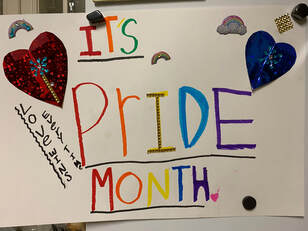 My daughter is a vehement supporter of LGBTQ+ rights. I’m not entirely sure how she got that way. I mean, I’d like to take the credit, but I’m not sure it all belongs to me. She has a true passion for justice, though, and as her mom, that makes me super proud. Perhaps it’s because of her own complicated history in the foster care system. She knows what it’s like to be on the receiving end of bullying. She knows the sting of insult, the pain of rejection, and she recognizes it in others. She doesn’t want anyone to feel those things, so she speaks out against them. But this particular issue has captured her attention in a way that other injustices have not. She makes signs and hangs them up around the house. (See below.) She draws rainbows everywhere, and she strings beads in ROY G. BIV order onto necklaces. We made a rainbow chandelier for her bedroom. She paints rainbows onto rocks, and her wardrobe is absolutely flamboyant with them. She’s loud and proud about her support of her gay aunts and uncles and transgender cousin. Others make crude and careless comments about gays—seventh graders are ripe with newly-formed opinions—but she holds her ground. It’s one of the few things she actually does tell me about her school day: the awful comments she hears and how she responds to them. An unfortunately common example: “That boy told me again that gay people are just wrong and shouldn’t be allowed to live, and I told him that he’s wrong and to go crawl in a hole and die.” (We’re still working on tact, but I love her warrior spirit.) In those moments, I’m simultaneously mortified and proud, which, I’m learning, is not all that uncommon in parenthood. When you see yourself reflected in your child’s behavior, good and bad alike, the experience can be quite humbling. (Although, to my credit, I have not ended an argument with “go crawl in a hole and die” in at least 25 years.) I am a recovering (often relapsing, if I’m totally honest) challenger. I’ve never been afraid to speak my mind, and I often engage in argument simply for the sport of it, much to the irritation of my husband, who thinks far more carefully before he speaks. I argue to dominate rather than persuade, because winning an argument and having the last word just feels good. (Even if it’s an ugly sort of good.) “Winning” doesn’t accomplish anything if the other person feels too railroaded to actually consider your points. My husband’s gentle tactics aren’t ineffective. I've found that days after I "win" arguments, his thoughtful words still ring in my ears. Carefully chosen words can have an incredibly long half-life. My daughter is totally right to be inflamed by those comments. I can’t fault her for that; I’m proud of her for that. She just needs to learn how to respond with respect, even when respect is not given in return. She’ll be a far more effective force with respect in her arsenal. The goal should be to persuade, not to belittle or demean. True persuasion cannot happen when the other party feels disrespected and unheard. As much as that boy’s comments grated on her nerves, I’m sure her aggressive response did the same to him. The true goal of dissent must be effectiveness, not dominance, if it is to cause any sort of lasting change, and that's the lesson I most want to teach my child. So while I’m so proud of my daughter for wanting equality enough to fight for it, I want her to be effective, and matching blows for blows is not the answer. There’s a better way, a higher way, and that way is mutual respect. I need to model it. We all do. Because I truly do believe, like my daughter’s sign says: Love wins. Every time. Happy Pride Month. |
Old Stuff.
January 2023
Categories.
All
|
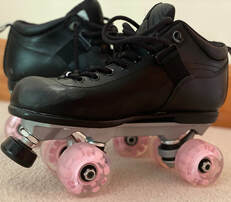
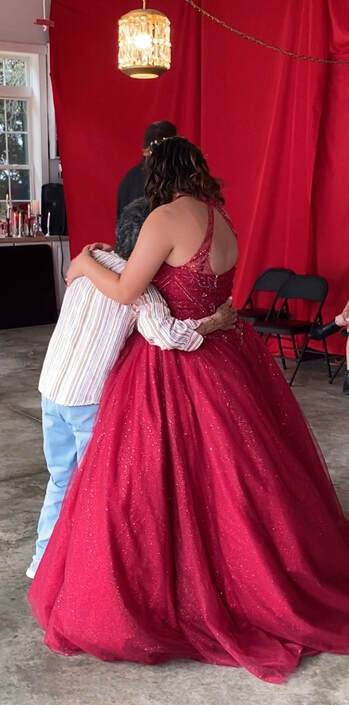
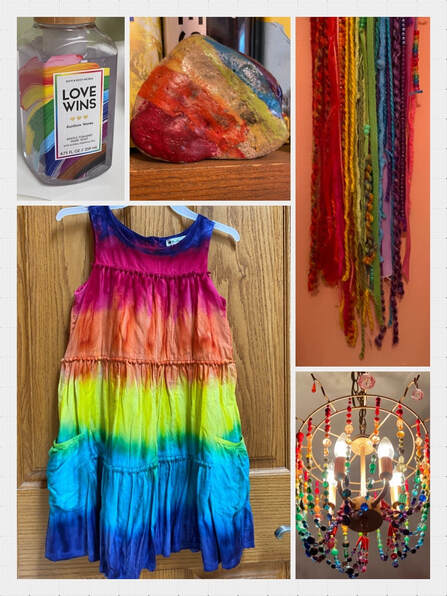
 RSS Feed
RSS Feed


